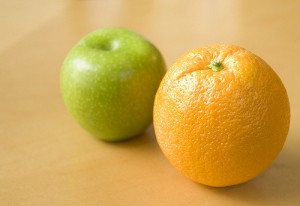
(Photo by TheBusyBrain at Flickr, CC License.)
Strangely, until now I’ve totally forgotten to write about the gradbøjning (”comparison inflection”) of adjectives…
As you can probably remember, Danish adjectives take various endings:
-e when it’s describing a definite noun (these often come with ”the” in English): den søde pige (the cute girl), den gamle ugle (the old owl), husenes røde farve (the red colour of the houses)
-e whenever the noun described is in plural: langsomme bilister (slow motorists), tallerknerne er tomme (the plates are empty)
-t when the noun described is neuter and indefinite (these often come with ”a” or ”an” in English): et grimt ansigt (an ugly face), teateret er stort (the theatre is big)
Okay, now let’s compare things… 🙂 Heldigvis (fortunately), the system works more or less as in English:
Strøget er mere underholdende end metroen, men Tivoli er mest underholdende! (The Strøget pedestrian street is more entertaining than the metro, but Tivoli is the most entertaining!)
Min far er stærkere end din far, men Palles far er stærkest! (My dad is stronger than your dad, but Palle’s dad is the strongest!)
Basic rule: Long adjectives (four or more syllables, or with the ending -ende such as spændende ’intersting’, ’exciting’) take mere and mest. Other adjectives take the endings -ere and -est.
The only letter ever added, is -e, as in: den kedeligste biograffilm (the most boring cinema movie)
Of course, the drunk sailors who created Danish out of love included some poetical exceptionalities:
lille – mindre – mindst (small, smaller, smallest)
stor – større – størst (big, bigger, biggest)
lang – længere – længst (long, longer, longest)
ung – yngre – yngst (young, younger, youngest)
gammel – ældre – ældst (old, older, oldest)
dårlig – værre – værst (bad, worse, worst)
god – bedre – bedst (good, better, best)





